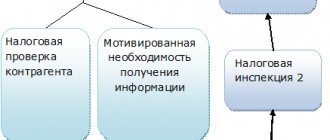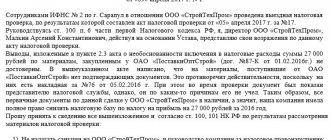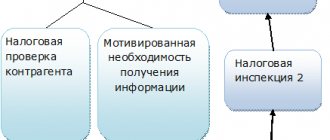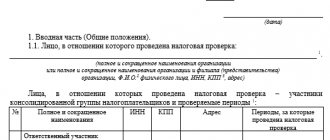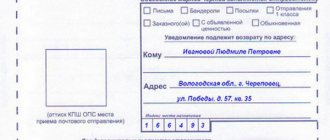The right of the Federal Tax Service to demand documents outside the scope of the inspection
According to clauses 1, 2 of Art. 93.1 of the Tax Code of the Russian Federation The Federal Tax Service has the right to request additional information from the taxpayer regarding the activities carried out by him. This is required for:
- in-depth study of audit materials;
- to receive clarification about a specific transaction,
- as part of the verification of the counterparty;
- in the process of collecting arrears on a large scale, including when collecting from counterparties.
We do not recommend ignoring the requirements of the Federal Service, as there are penalties for this.
Requesting documents during a tax audit
Paragraph 2 of Article 93.1 of the Tax Code of the Russian Federation states that the inspection has the right to request and receive documents (information) regarding a specific transaction from the participants in this transaction or from other persons who have documents (information) about it. From the recently published position of the Federal Tax Service on this topic, it follows that a transaction is considered specific if the inspection request specifies the period of the transaction and the list of required documents.
The Tax Code of the Russian Federation gives inspectors the right to check not only the “controlled” company itself, but also its partners. Article 93.1 sets out the rules for requesting documents from counterparties of the company being inspected. This means that the inspection may request documents from you - about your counterparties, and from your counterparties - about you.
The essence of the counter check
So, paragraph 1 of Article 93.1 allows tax authorities to demand from a partner of a controlled company information regarding its activities. Inspectors can request documents (information) on a specific transaction from its participants or from other persons who have documents (information) about this transaction both within and outside the framework of tax audits (clause 2 of Article 93.1 of the Tax Code of the Russian Federation).
Inspectors may request any documents regarding a specific transaction from any persons possessing such information. Including those that relate to a specific employee of a company or individual entrepreneur (for example, papers with his signature) (letter of the Federal Tax Service of Russia dated 02.08.2018 No. ED-4-2 / [email protected] ).
The inspectorate sends an order to request documents to the tax authority at the place of registration of the taxpayer, from whom the necessary documents must be requested.
The order indicates during which event the need to submit documents arose, and when requesting information regarding a specific transaction, information is also indicated that makes it possible to identify this transaction (clause 3 of Article 93.1 of the Tax Code of the Russian Federation).
This is reflected in the form of the request for the provision of documents (information), approved by Order of the Federal Tax Service of the Russian Federation dated November 7, 2018 No. ММВ-7-2/ [email protected]
This may be information about the parties to the transaction, its subject and the conditions of the transaction.
If it is difficult to provide documents
If you cannot submit the required papers within the specified time frame, ask for more time. The law allows tax authorities to extend the deadline. Clause 5 of Article 93.1 of the Tax Code of the Russian Federation allows, if there are objective reasons, to petition the inspectorate to extend the deadline for submitting the requested documents.
For refusal to provide the inspection with documents on the counterparty at its request, the company faces a considerable fine - 10,000 rubles (Part 2 of Article 126 of the Tax Code of the Russian Federation). The same liability is provided for untimely provision, evasion of providing documents and provision of documents with false information.
But for unlawful failure to report (untimely communication) the requested information about the counterparty, another liability is provided - a fine of 5,000 rubles, and in case of repeated violation within a calendar year - 20,000 rubles (Article 129.1 of the Tax Code of the Russian Federation).
New position of the Federal Tax Service
In the decision dated September 23, 2019 No. KCh-4-9/ [email protected] the Federal Tax Service of the Russian Federation, in response to a complaint from a fined company, which refused in writing to provide documents and information about its counterparty due to the fact that it was not clear from the inspection requirement what specific deal is being discussed, indicated the following.
The company refused illegally. The request that was sent to her indicated the period of time for which documents (information) were requested - 2015-2017, and a list of them.
The list includes an agreement (contract, agreement), an act of completed work, an act of offsetting mutual claims, an act of reconciliation of settlements with suppliers (buyers), an invoice, a cash receipt and outgoing order, accounting cards for the counterparty, a power of attorney, and other documents.
There is an indication of the tax control event during which the need to request documents (information) arose.
That is, the request contains “necessary and sufficient data to enable us to identify which documents are being requested.” Article 93.1 does not establish the obligation to indicate details or other individualizing features of documents for tax authorities.
The fine is legal.
Most likely, the court, if the fined company decides to challenge this decision, will not find any violations in the actions of the tax authorities.
Back in the letter dated October 15, 2018 No. 03-02-07/1/73833, the Ministry of Finance drew attention to the Ruling of the Supreme Court of the Russian Federation dated October 26, 2017 No. 302-KG17-15714. It states that Article 93.1 of the Tax Code of the Russian Federation does not establish the obligation to indicate details or other individualizing features of documents (information) in the tax authority’s request for their presentation. It turns out that tax officials do not have to include the details of the requested documents in the request. The request must contain information that can only be used to determine the transaction that is of interest to the controllers.
This means that the company from which the inspection requests documents must provide everything that can be attributed to the entity of interest to it.
Another thing is that you may not be able to do it in five days. All that remains is to ask for a deferment.
What may be requested
There is no closed list of documentation that the inspectorate has the right to request outside of an inspection. It all depends on the circumstances in which the need for additional confirmation of information arose.
Fiscal requirements are mainly aimed at presenting the following types of documentation:
- agreements, contracts and agreements on transactions;
- invoices;
- invoices or certificates of completed work (services);
- universal transfer documents;
- purchase book, sales book;
- payment orders and bank account statements confirming payment (settlements);
- checks, receipts, BSO confirming payment;
- advance reports and documentation for them (orders, hotel receipts, tickets, checks), if the transaction was executed by a posted employee;
- other financial and accounting forms confirming transaction transactions;
- letters of claim, notifications and demands addressed to the counterparty under the contract;
- conclusions of experts, auditors and other persons regarding the transaction.
In essence, the Federal Tax Service requires the taxpayer to confirm in its request the information provided by the counterparty in respect of whom a fiscal audit is currently being conducted.
How many days are given for a response?
The period for preparing and sending to the Federal Tax Service the information requested outside the framework of tax audits depends on how the request is received from the controllers:
If these deadlines are not met, the taxpayer may experience trouble, the types and extent of which will be discussed below.
Get more information about important deadlines for taxpayers:
- “What is the deadline for issuing an invoice by the seller”;
- “What is the period for consideration of a bankruptcy case”;
- “Simplified taxation system - deadlines for submitting reports.”
Deadlines for responding to a request
Prepare a response to a request for documents outside the framework of a tax audit within 5 business days from the date of receipt, unless otherwise provided by the requirement from the Federal Tax Service (clauses 2, 6 of Article 6.1, clauses 3, 6 of Article 88 of the Tax Code of the Russian Federation).
IMPORTANT!
The deadline for submitting information on requests from the Federal Tax Service received from March 1 to June 30, 2022 inclusive, is 25 working days after their receipt (clause 2, 6, article 6.1, clause 3, 6, article 88 of the Tax Code of the Russian Federation, clause 3 Government Decree No. 409 dated April 2, 2020).
The inspection process for companies and individual entrepreneurs
So, tax inspectors have come to inspect you. We will give answers to questions that usually arise from audited taxpayers.
On the basis of what documents do inspectors act?
It depends on what basis they conduct the inspection:
- During an on-site audit - based on the decision of the management of the Federal Tax Service to conduct an on-site tax audit.
- During a desk inspection - on the basis of a reasoned resolution of an official of the Federal Tax Service to conduct an inspection in the cases provided for in paragraphs 8 and 8.1 of Article 88 of the Code. The resolution is drawn up by a specialist who carries out a desk audit of the VAT declaration, and is approved by the head of the Federal Tax Service or his deputy.
When presenting for inspection, the Federal Tax Service specialists must present one of the mentioned documents along with their service IDs.
Do inspectors warn about the visit?
The taxpayer may be notified in advance of an inspection of its territory and premises. However, the Tax Code does not contain provisions that oblige specialists and the Federal Tax Service to warn about this in advance. So the inspector's visit may come as a surprise.
When can the inspection take place?
Inspectors can come for inspection only during working hours , which are established according to internal labor regulations. If specialists from the Federal Tax Service arrive beyond this time, the taxpayer has the right to refuse them. It happens that the inspection is delayed, that is, the organization’s working day has come to an end, but the inspection has not yet taken place. In this case, the process can be continued with the consent of the reviewer .
What can and cannot inspectors inspect?
The Tax Code does not contain provisions that prohibit inspectors from inspecting certain items or establish any special rules in relation to them. Anything that the inspector considers may be relevant to the inspection is subject to inspection. Inspectors can take photographs and videos during the process, and copy documents.
Do inspectors have the right to inspect software on a computer?
Inspectors can inspect the taxpayer’s computer—the software and the information contained on it.
Yes, this is legal (determination of the RF Armed Forces dated July 17, 2017 No. 302-KG17-8315). The computer itself does not carry any information, but the data stored on it may be important for the completeness of the tax audit. Essentially, these are the same documents, only in electronic format. However, it is impossible to inspect a PC without viewing installed programs, so inspectors can run and inspect the software.
Who should be present during the inspection?
The inspection is carried out in the presence of inspection officials and witnesses . If the latter are not present, this is a violation that may lead to the court’s non-recognition of evidence obtained during the inspection. However, in practice it happened that the courts, having recognized the illegality of conducting an inspection without witnesses, still agreed with his conclusions that the activities of the counterparty of the inspected entity were not actually carried out.
What happens if the taxpayer refuses to let the inspectors in?
In accordance with subparagraph 7 of paragraph 1 of Article 31 of the Tax Code, as well as Article 19.7.6 of the Code of Administrative Offences, illegally preventing a tax authority official from entering the territory of the inspected entity is considered obstruction of access. In this case, the responsible employee in the group of inspectors must draw up a report that is signed by both parties.
A fine of 10 thousand rubles will be imposed on the taxpayer's official. In addition, paragraph 3 of Article 91 of the Tax Code of the Russian Federation gives in this case the right to inspectors to independently determine the amount of tax payable based on available information and similar cases. This right is supported by the decision of the Supreme Court of the Russian Federation dated October 24, 2017 No. 308-KG17-15031. That is, a very significant amount may be assessed for payment, which will not be easy to challenge in court.
